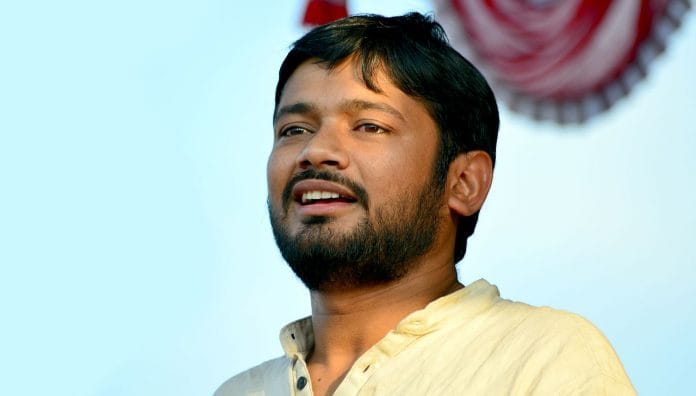New Delhi: The AAP-led Delhi government has given its sanction for the prosecution of former JNU Students Union president Kanhaiya Kumar and nine others, in connection with a sedition case registered against them in 2016 for allegedly raising anti-national slogans.
Apart from Kumar, the order issued by the Deputy Secretary (Home) also granted sanction to prosecute Syed Umar Khalid, Anirban Bhattacharya, Aquib Hussain, Mujeed Hussain Gattoo, Muneeb Hussain Gattoo, Umair Gul, Rayees Rasool, Basharat Ali and Khalid Bashir Bhat.
The decision comes seven months after government standing counsel Rahul Mehra reportedly advised against the grant of sanction.
In a statement released Friday, the AAP government stated that it does not interfere in such cases “as a matter of policy and as a matter of principle”.
“Our government has not stopped prosecution in any case, whatsoever, in the last 5 years. This is purely a procedural matter,” it added.
Statement on grant of prosecution sanction by Delhi government pic.twitter.com/0XUxkO5cup
— Ankit Lal (@AnkitLal) February 28, 2020
ThePrint looks at when sanction for a sedition case is granted and the instances when it was refused.
Also read: Kanhaiya says prosecution order has come now because he was to contest 2020 Bihar polls
The JNU sedition case
In 2016, Kumar, along with several other students, was accused of raising “anti-national” slogans on the JNU campus while protesting against the hanging of 2001 Parliament attack convict Afzal Guru. Kumar, Khalid and Bhattacharya were arrested in February 2016 for their involvement in the protest.
The police filed a chargesheet on 14 January last year, three years after the incident. The ten individuals mentioned in the sanction, including Kumar and Khalid, were named as the main accused in the chargesheet.
In addition to sedition, the accused had also been charged under Sections 323 (punishment for voluntarily causing hurt), 465 (punishment for forgery), 471 (using as genuine a forged document or electronic record), 143 (punishment for being a member of an unlawful assembly), 149 (being a member of an unlawful assembly), 147 (punishment for rioting) and 120B (criminal conspiracy) of the Indian Penal Code.
Since then, a lower court in Delhi had given the government multiple deadlines to decide on the issue of grant of sanction to prosecute the accused. During the last hearing on 19 February, the court had ordered the Delhi government to file a status report by 3 April on the pendency of the sanctions.
When is a sanction needed?
Under Section 196 of the Code of Criminal Procedure, courts cannot take cognisance of any offence punishable under Chapter VI of the Indian Penal Code, “except with the previous sanction of the Central Government or of the State Government”.
Section VI of the IPC, which covers Sections 121 to 130, lists the offences against the State. Apart from sedition, it includes offences such as Section 121 (waging war against the government of India), 124 (assaulting President, Governor etc with intent to compel or restrain the exercise of any lawful power), and 128 (public servant voluntarily allowing prisoner of State or war to escape).
Apart from these, sanction is also required for offences such as IPC Section 153A (promoting enmity between different groups on grounds of religion, race, place of birth, residence, language, etc.) and 295A (deliberate and malicious acts, intended to outrage religious feelings of any class by insulting its religion or religious beliefs).
Section 196 mandates that the government should provide sanction to prosecute the accused under these offences, before the courts step in. Simply put, charges cannot be framed against the accused, unless the government approves and sanctions the chargesheet filed by the prosecution.
Can a sanction be refused?
There have been instances in the past where governments have refused to give sanction in such cases.
In July 2018, a Panchkula court dropped the sedition charges against the 41 accused of the violence that followed the conviction of Dera Sacha Sauda chief Gurmeet Ram Rahim Singh. The charges were dropped after the Haryana government denied sanction to prosecute them under Section 124A IPC.
In a 2012 case filed against Bharat Desai, resident editor of The Times of India in Ahmedabad, the police had sought sanctions from the state government for both defamation and sedition, but the government only granted sanction for defamation.
Desai was charged with sedition for writing articles on purported links between the city’s police and the underworld. The newspaper had published articles questioning the appointment of O.P. Mathur as Ahmedabad’s police commissioner and alleged he was linked to an underworld don. Mathur, in turn, filed a case of sedition against Desai.
The high court, however, opined that it was “really absurd to say that articles in question amount to sedition”.
Also read: What’s Lalita Kumari case? SC verdict judge Muralidhar held up as model for Delhi Police







What ever it maybe I don’t feel the person named Kannahyakumar can be anti nationalist or some thing like this
No matter what cause one defends, it will suffer permanent disgrace if one resorts to blind attacks on crowds of innocent people.’
–Albert Camus
‘Rather leave the crime of the guilty unpunished than condemn the innocent.’
–Marcus Tullius Cicero
Keeping the politics aside, why do we need government’s sanction for prospecting crime? What is the rationale? Isn’t that against the idea of rule of law? Shouldn’t police be independent/autonomous enough to prosecute alleged crimes?